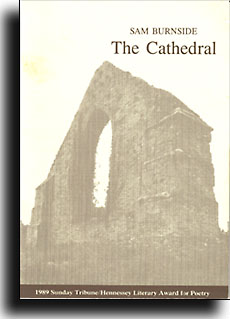 First published in 1989
First published in 1989
An additional stanza, added to The Cathedral, at the suggestion of RJ Hunter, September, 2007. To be published by St Columb’s Cathedral, 2008
Weighty Stones: Mighty Men
Were they truly great and mighty men
head and shoulders above the rest
(above the dunderheads and fools,
their faces deep in bog-holes
grubbing after meat) or, were they,
merely, instruments of monarchs; or, more properly,
given their calling, servants, followers
of true vocations, informed by heart and head and conscience.
Men, such as these three, among others,
Bramhall and Harvey and Berkeley
(two Bishops and a Dean)
Their fleeting presences
can still be sensed –
two ring-ed fingers and one bare, there,
resting on that door frame, then only
these ghostly imprints laid on varnish,
telling of their comings in or goings out.
Harvey, with his improvement programme for Ireland,
draining of bogs, building of bridges, making of roads,
the importing of art; or Urbane Berkeley, writing
to Samuel Johnston educating
the new world, insisting,
God is always here, listening
if any tree should fall; asserting,
Times noblest offspring is the last
Bramhall debating with Hobbes proclaiming
his idea of liberty: Effective power of the rational will.
They remain here, half-lost among shadows
their grey forms ebbing and flowing
in thought and idea and action,
threads woven into one skein,
engagement is all!
Their voices remain indestructible –
this is their true bequest.
How many of us, we, standing here,
gawking, may say as much.
NOTES
The Cathedral was first published in 1989. In 2007 RJ Hunter suggested it be re-printed to include a new stanza recording the presence of some important individuals who in been ignored in the original and who in cultural terms linked Londonderry with the wider world.
Derry, for a time, and together with the rest of plantation Ireland, and Ireland as a whole, held, for that moment, a certain pivotal centre of energy: great forces ebbed and flowed around its relationship with other parts of the three Kingdoms.
Central to this driving energy, was the personality of those individuals who represented the forces of power at that time. They have left their marks on Ireland, and on the north west and on the intellectual and cultural life of other parts of the world: among these are the following –
Harvey, Earl-Bishop: Made Bishop of Derry in 1768. A great builder and an improver and a great liberal who instinctively favoured religious equality. Such endeavours earned him the nickname the, “Edifying Bishop”. As well as being industrious and vigilant he was considered, variously, clever and cultured, licentious and eccentric. He was a man who carried with him diversity of thought and colour of character.
Berkeley: In America, where a relatively free economy and immense unexploited natural resources held out prospects of boundless progress, such ideas as those exploited by Berkeley were generally accepted. It became easy for Americans to suppose that the mission to regenerate the world had shifted westward to their side of the Atlantic Ocean. On such a tide of sentiment, these words of Bishop George Berkeley could only have encouraged them:
“Westward the course of empire takes its way;
The four first acts already past,
A fifth shall close the drama with the day;
Time’s noblest offspring is the last…” (Tuveson, p. 94)
Berkeley’s influence is reflected in the institutions of education named in his honour. Both University of California, Berkeley and the city that grew up around the university, were named after him.The naming was first suggested in 1866 by a trustee of the then College of California, Frederick Billings. Billings was inspired by Berkeley’s Verses on the Prospect of Planting Arts and Learning in America, particularly the final stanza, given above: “Westward the course of empire takes its way; The first four Acts already past, A fifth shall close the Drama with the day; Time’s noblest offspring is the last.” His influence grew immense. A residential college in Yale University also bears Berkeley’s name, as does a reading room of the Library at Trinity College, Dublin. The German philosopher Arthur Schopenhauer wrote of him: “Berkeley was … the first to treat the subjective starting-point really seriously and to demonstrate irrefutably its absolute necessity. He is the father of idealism…”
Bramhall: his consecration chair of 1633 remains in St Columb’s Cathedral; he fled Derry as result of the 1641 rebellion and did not return till 1660, when he was re reinstated. A ceremonial high church Anglican and no radical, in his reply to Hobbes, with whom he engaged in a debate about church government, Bramhall wrote, true to his belief: Reason is the root, the fountain, the original of true liberty, which judgeth and representeth to the will whether this or that be convenient, whether this or that be more convenient.